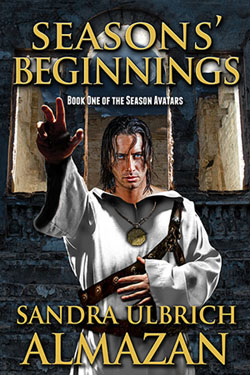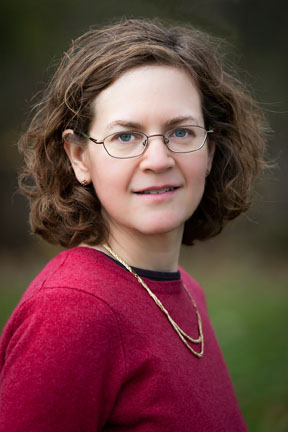My son went through a stage where he was obsessed with ancient Egypt. We read lots of books about it, watched documentaries, and visited the Field Museum and the Oriental Institute in Chicago. I picked up a lot of knowledge about the culture (and other ancient Middle Eastern cultures) myself. Since Seasons’ Beginnings, the first book in my Season Avatars series, is a prequel and set several hundred years before the rest of the series, I wanted to incorporate some of what I’d learned about ancient cultures in the setting of Seasons’ Beginnings. However, although the country I’d developed has a river snaking through it, it has a more temperate climate than Egypt. How could I adapt ancient Egyptian and Middle Eastern cultures for my world?Please join me in welcoming Sandra Ulbrich Almazan talking about adapting ancient settings in her new novel, Seasons’ Beginnings.
I’m captivated by the ancient setting of her book, and even more so by her character, Kron Evenhanded–a mage of the type artificer–who takes on the role of finder! (Sound familiar?) 🙂
If that rocks your boat as much as it does mine, be sure to click over here for a sample once you read what Sandra has to say. (It’s fascinating!)
~ kah
There are no pyramids or animal-headed gods in my world. The climate wouldn’t permit hippos to swim in my river or camels to travel across my land. Instead, I focused on areas that I thought would translate better to my setting. These areas include food, politics, and technology.
Grains are a staple in many cultures, and their uses are also similar. Women have to grind grain at home before they can cook with it. My characters eat flatcakes made from ground grains and drink beer. There’s a scene where my main character visits a brewer, and she has to strain the solid material out of the beer before serving it to him, just like an ancient brewer would have. Wine is also available, although it’s imported from across the sea by ship. Just like in Egypt, my characters obtain fish and greens from the river.
Although ancient Egypt is known for its pharaohs and the division into Upper and Lower Egypt, other ancient cultures, such as the Hittites and the Babylonians, organized around city-states. The city-states, ruled by kings, could conquer other lands to form empires or gain power when an empire collapsed. Most of Season’s Beginnings takes place in the city of Vistichia, which is initially ruled by a city-king. The Oriental Institute has on display reliefs from the courtyard of an Assyrian king. The magnificence of this exhibit inspired me to create a mosaic for the courtyard of the Magic Institute, another setting in Seasons’ Beginnings. This mosaic has a different design and a different purpose; it’s a memorable image magicians can use as a guide when transporting themselves to the Magic Institute.

Although magic plays an important part in my story, my main character channels his magic through man-made objects. The technology level (Bronze Age) of the story therefore is important. As my main character must face someone who has time magic, he needs materials that don’t break down easily and goes to desperate lengths to get them. He also uses water clocks and sun dials to counter the time magic. Some of the other things my hero uses for his magic are necklaces (their materials and designs are inspired by ancient cultures), weavings, and clothing.
Borrowing from other cultures may not always be overt. There are many aspects to a culture, such as language, religion, customs, and more, that can be used as is or adapted to a different setting. The key is to make sure these borrowed items are a natural fit to the setting or can be imported from contact with another culture. With a little thought, any culture can be based on another yet still unique.
Buy Seasons’ Beginnings at Amazon
Buy Seasons’ Beginnings at Barnes and Noble
Sandra Ulbrich Almazan started reading at the age of three and only stops when absolutely required to. Although she hasn’t been writing quite that long, she did compose a very simple play in German during middle school. Her science fiction novella Move Over Ms. L. (an early version of Lyon’s Legacy) earned an Honorable Mention in the 2001 UPC Science Fiction Awards, and her short story “A Reptile at the Reunion” was published in the anthology Firestorm of Dragons. Other published works by Sandra include Twinned Universes and several science fiction and fantasy short stories. She is a founding member of Broad Universe, which promotes science fiction, fantasy, and horror written by women. Her undergraduate degree is in molecular biology/English, and she has a Master of Technical and Scientific Communication degree. Her day job is in the laboratory of an enzyme company; she’s also been a technical writer and a part-time copyeditor for a local newspaper. Some of her other accomplishments are losing on Jeopardy! and taking a stuffed orca to three continents. She lives in the Chicago area with her husband, Eugene; and son, Alex. In her rare moments of free time, she enjoys crocheting, listening to classic rock (particularly the Beatles), and watching improv comedy.
Sandra can be found online at her website, blog, Twitter, Facebook, and Goodreads.

 A review of Jonathan Strange & Mr. Norrell by Susanna Clarke for my
A review of Jonathan Strange & Mr. Norrell by Susanna Clarke for my